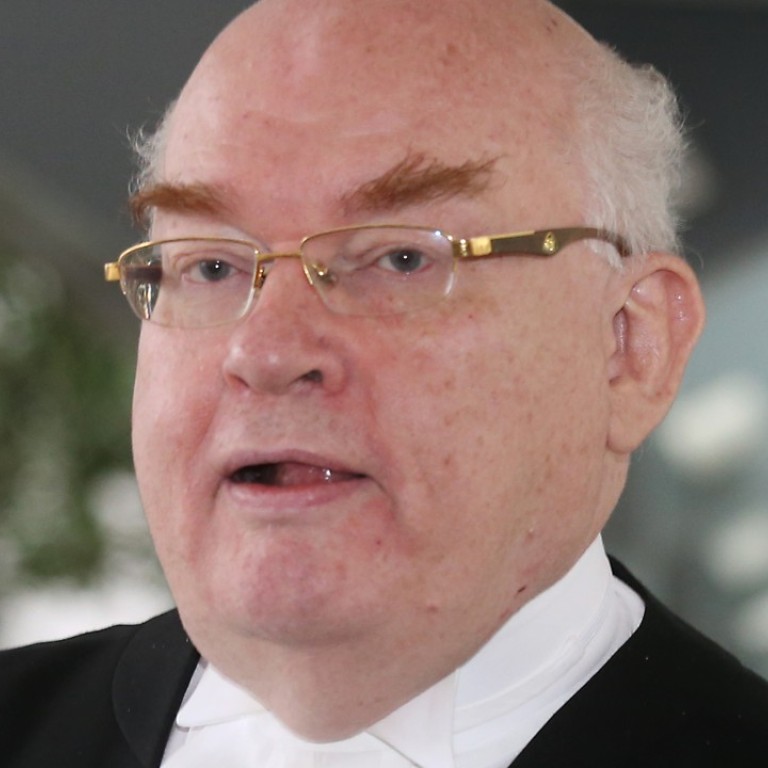
Legal eagles led by Philip Dykes to run in Hong Kong Bar Association polls, vowing to ‘stand fearlessly’ for judicial independence
Six-member group says it hopes to bring knowledge and experience as city gets set to face legal debates over controversial issues in coming years
Shock waves were sent through Hong Kong’s legal circles on Friday after it emerged that a star-studded line-up – led by prominent human rights lawyer Philip Dykes SC – will contest the Bar Association election next month amid criticism that the legal body has recently been less vocal in defending the city’s rule of law.
Dykes – who was chairman of the Bar Council, the association’s governing body, in 2005 and 2006 – will run for the same post again after a decade.
Joining him are several legal heavyweights aiming for council membership, including Lawrence Lok Ying-kam SC and Professor Johannes Chan Man-mun, the former law dean of the University of Hong Kong and the city’s first and so far only honorary senior counsel in Hong Kong.
Don’t bring politics into court, Hong Kong Bar Association chief warns after ‘yellow’ remark in Occupy assault case
Barristers Erik Shum Sze-man, Joe Chan Wai-yin and Randy Shek form the remaining three on the six-person list, which has the campaign slogan: “A strong bar, a strong rule of law”.
“Our vision is a strong bar that stands up fearlessly for the rule of law and judicial independence,” the group said in a statement. “We want to work closely with our young members who represent the future. We believe in healthy competition.”
Dykes is set to run against incumbent chairman Paul Lam Ting-kwok SC, who earlier hinted at securing a second term. It is rare for any incumbent chairman to face competition, with an unspoken rule that the person stays in the post for two years.

A number of lawyers and scholars, including Johannes Chan, questioned the legal basis for the proposal, which would for the first time allow mainland officials to enforce national laws in part of the rail terminus in Hong Kong.
In the statement, the Bar Association only “noted” public discussions concerning the legal and constitutional basis of the joint checkpoint arrangement, and “urged” the government to keep the general public informed to facilitate a constructive discussion, pledging to “monitor” developments closely.
Admit that Basic Law does not provide legal basis for joint checkpoint plan, Jasper Tsang urges Hong Kong officials
“We hope the Bar Association can contribute to society by issuing a clear stance [on these issues] as Hongkongers have great expectations of the body,” Shek told the Post.
“The association has the duty to be seen by society as a professional body that would defend the city’s principles, rule of law and judicial independence.”
The association has the duty to be seen by society as a professional body that would defend the city’s principles, rule of law and judicial independence
Shek, also a member of the Progressive Lawyers Group, said most of the current Bar Council members focused on civil law with very few specialising in criminal law and public law.
“There will be a lot of debates on constitutional matters in the coming two years and we hope we can bring our knowledge and experience to the council,” he added, describing Dykes and Johannes Chan as “impeccable” in their knowledge of public law.
When asked if Paul Lam’s performance was the catalyst triggering them to run, Shek said they were neither targeting anyone nor planning to take over the council, which consisted of 20 members.
“We are not focusing on what has [been improperly done] in the past, but more on what we can do in the future.”
The Bar Council election will take place on January 18.
In 2003, the Bar Association – then led by Civic Party veteran Alan Leong Kah-kit SC – played a key role in opposing legislation on a national security law. The bill was eventually shelved after 500,000 people took to the streets, fearing their rights and freedoms would be curbed.

